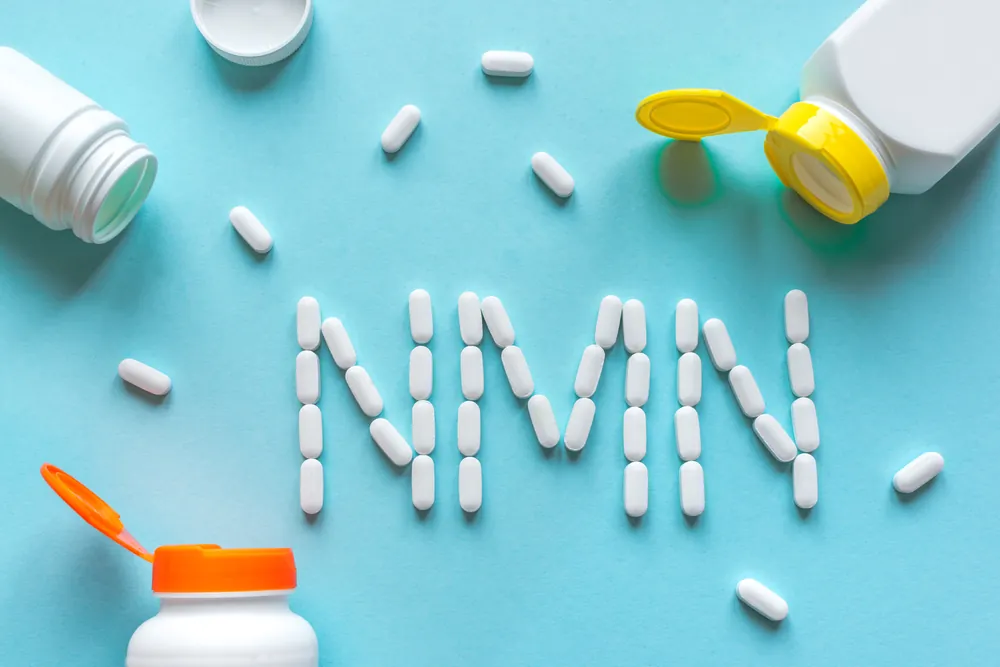Human Clinical Trials of NMN for Safety and Effectiveness
- Current clinical trials point toward NMN safety, but they lack in size and duration.

In a recent paper, researchers reviewed the literature for human clinical trials that address NMN’s safety and anti-aging effects [1].
The roles of NAD+ and NMN in aging
NAD+ (nicotinamide adenine dinucleotide) is a molecule essential in such processes as metabolism, cell death, aging, DNA repair, gene expression, or neuroinflammation.
Its concentration in human tissues decreases with age. This decrease is linked to several age-related diseases, including metabolic diseases and cognitive decline, along with the hallmarks of aging. Fortunately, it has been found to be possible to increase the concentration of NAD+ with the precursor known as NMN.
NMN is promoted as an anti-aging health supplement and is used in cosmetic products, even though most of the studies that show its possible anti-aging effect have only been conducted in cells or on animals. There have also been concerns regarding NMN’s safety as a supplement.
Therefore, researchers reviewed ten recent NMN clinical trials to gain an understanding of its safety and physiological effects on humans. They also summarized current knowledge about NMN in humans and animals:
NMN in human clinical trials
The first and most essential question for anything given to human beings is its safety, which is addressed by all ten human clinical trials [2-11].
These studies were done using different doses of NMN, and they differed in length, number, and age of participants. Doses ranged from 100 mg once a day to a full gram twice a day. The duration of these studies varied from 14 days to 12 weeks. Overall, NMN was well tolerated, and the researchers concluded that NMN is safe.
In these studies, most selected participants were over 55, and middle-aged people (below 40) were recruited for only two trials. However, as it may be more effective to start this intervention earlier, there is a need for longitudinal studies in younger populations. There is also a need for larger cohorts in order to better assess the appropriate dosage of NMN.
Even though, so far, human clinical trials of NMN didn’t report any adverse effects, other studies have reported possible toxic effects. For example, another study [12] reported that NMN supplementation could lead to the enhancement of the pro-inflammatory senescence-associated secretory phenotype (SASP) in senescent cells. It can also promote pancreatic cancer progression in mouse models. Overall, there is limited information on the full toxicology ofl NMN.
Testing specifics and subgroups
Some researchers assessed sleep quality as one of the indicators of health effects. Populations included in those studies included either healthy men or overweight and obese elderly people (age 65 and older). However, there was no significant difference in sleep quality and fatigue before and after NMN supplementation.
NMN was reported to improve the functions of an organism that are also improved by endurance exercise, such as mitochondrial function. Therefore, some researchers looked into how NMN supplementation influences physical activity in older adults.
In 20 healthy men aged 65 and older, researchers didn’t observe NMN having an impact on insulin sensitivity, skeletal muscle, or visceral fat mass. On the other hand, participants who took NMN performed better in the speed and strength tests, suggesting that NMN supplementation can help prevent age-related muscle dysfunction.
Another paper investigated the influence of NMN supplementation on the physical performance of older adults. Participants showed significant improvement in only one of the strength tests before and after supplementation.
Some researchers also looked at middle-aged people. One paper included 48 recreational runners between 27 to 50 years old. During the trial, participants performed aerobic exercise, such as running and cycling, five or six times a week. NMN supplementation was linked to increased oxygen and energy consumption, suggesting that NMN supplementation has the potential to improve athletic performance.
Another research group tested a 6-minute walking endurance test among 40- to 65-year-olds. At the end of the 60-day period, people who took NMN showed improvement in walking endurance, but it was not statistically significant.
NMN was also tested for its effect on diabetes. One of the studies, which investigated 25 postmenopausal women, has shown that NMN supplementation can lead to an increase in muscle insulin sensitivity and insulin signaling in overweight or obese women with prediabetes.
Previous studies on mice have reported that NMN can help maintain telomere length in the liver [13]. A study of 8 middle-aged men (45-60 years old) reported that after 90 days of NMN supplementation, telomere length in blood cells nearly doubled, suggesting an anti-aging effect.
Challenges ahead
Clinical trials related to NMN are far from done. Beyond the already published trials, the authors identified 13 completed but unpublished and 11 ongoing clinical trials. Those trials aim to address the safety of NMN in healthy adults and address the effects of NMN on various diseases, such as diabetes and hypertension.
There are also ongoing investigations into the anti-aging effects of NMN. Some of those trials investigate NMN’s effect on the skin, for example, its impact on fine lines and wrinkles, eyebags, dark circles, or skin texture. On the molecular level, some studies address changes in hormonal levels and aging markers, male fertility markers, cardiovascular and metabolic function, and physical activity.
Even though published clinical trials suggest that NMN is safe and has potential anti-aging effects, several challenges must be addressed before NMN should be confidently marketed to the public.
First, there is a need for longer and larger clinical trials with proper experimental design. Since supplements are usually taken for a long time, trials should be run longer to address adverse effects that may become evident upon long-term use. Similarly, diverse populations should be included in the studies to test whether the effects impact only certain subpopulations.
Studies should also address the mechanism through which NMN exerts its effects and gain a better understanding of its potential toxicology. Such things as the influence of NMN on different enzymes or the microbiome, as well as safe dose ranges in different populations, were almost absent in the completed studies. These issues should be addressed for better understanding of side effects and the understanding of the molecular mechanism of NMN in the human body.
Literature
[1] Song, Q., Zhou, X., Xu, K., Liu, S., Zhu, X., & Yang, J. (2023). The Safety and Antiaging Effects of Nicotinamide Mononucleotide in Human Clinical Trials: an Update. Advances in nutrition (Bethesda, Md.), S2161-8313(23)01359-5. Advance online publication.
[2] Fukamizu, Y., Uchida, Y., Shigekawa, A., Sato, T., Kosaka, H., & Sakurai, T. (2022). Safety evaluation of ß-nicotinamide mononucleotide oral administration in healthy adult men and women. Scientific reports, 12(1), 14442.
[3] Irie, J., Inagaki, E., Fujita, M., Nakaya, H., Mitsuishi, M., Yamaguchi, S., Yamashita, K., Shigaki, S., Ono, T., Yukioka, H., Okano, H., Nabeshima, Y. I., Imai, S. I., Yasui, M., Tsubota, K., & Itoh, H. (2020). Effect of oral administration of nicotinamide mononucleotide on clinical parameters and nicotinamide metabolite levels in healthy Japanese men. Endocrine journal, 67(2), 153–160.
[4] Okabe, K., Yaku, K., Uchida, Y., Fukamizu, Y., Sato, T., Sakurai, T., Tobe, K., & Nakagawa, T. (2022). Oral Administration of Nicotinamide Mononucleotide Is Safe and Efficiently Increases Blood Nicotinamide Adenine Dinucleotide Levels in Healthy Subjects. Frontiers in nutrition, 9, 868640.
[5] Pencina, K. M., Lavu, S., Dos Santos, M., Beleva, Y. M., Cheng, M., Livingston, D., & Bhasin, S. (2023). MIB-626, an Oral Formulation of a Microcrystalline Unique Polymorph of ß-Nicotinamide Mononucleotide, Increases Circulating Nicotinamide Adenine Dinucleotide and its Metabolome in Middle-Aged and Older Adults. The journals of gerontology. Series A, Biological sciences and medical sciences, 78(1), 90–96.
[6] Yoshino, M., Yoshino, J., Kayser, B. D., Patti, G. J., Franczyk, M. P., Mills, K. F., Sindelar, M., Pietka, T., Patterson, B. W., Imai, S. I., & Klein, S. (2021). Nicotinamide mononucleotide increases muscle insulin sensitivity in prediabetic women. Science (New York, N.Y.), 372(6547), 1224–1229.
[7] Liao, B., Zhao, Y., Wang, D., Zhang, X., Hao, X., & Hu, M. (2021). Nicotinamide mononucleotide supplementation enhances aerobic capacity in amateur runners: a randomized, double-blind study. Journal of the International Society of Sports Nutrition, 18(1), 54. https://doi.org/10.1186/s12970-021-00442-4
[8] Igarashi, M., Nakagawa-Nagahama, Y., Miura, M., Kashiwabara, K., Yaku, K., Sawada, M., Sekine, R., Fukamizu, Y., Sato, T., Sakurai, T., Sato, J., Ino, K., Kubota, N., Nakagawa, T., Kadowaki, T., & Yamauchi, T. (2022). Chronic nicotinamide mononucleotide supplementation elevates blood nicotinamide adenine dinucleotide levels and alters muscle function in healthy older men. npj aging, 8(1), 5.
[9] Kim, M., Seol, J., Sato, T., Fukamizu, Y., Sakurai, T., & Okura, T. (2022). Effect of 12-Week Intake of Nicotinamide Mononucleotide on Sleep Quality, Fatigue, and Physical Performance in Older Japanese Adults: A Randomized, Double-Blind Placebo-Controlled Study. Nutrients, 14(4), 755.
[10] Niu, K. M., Bao, T., Gao, L., Ru, M., Li, Y., Jiang, L., Ye, C., Wang, S., & Wu, X. (2021). The Impacts of Short-Term NMN Supplementation on Serum Metabolism, Fecal Microbiota, and Telomere Length in Pre-Aging Phase. Frontiers in nutrition, 8, 756243. https://doi.org/10.3389/fnut.2021.756243
[11] Huang H. (2022). A Multicentre, Randomised, Double Blind, Parallel Design, Placebo Controlled Study to Evaluate the Efficacy and Safety of Uthever (NMN Supplement), an Orally Administered Supplementation in Middle Aged and Older Adults. Frontiers in aging, 3, 851698.
[12] Nacarelli, T., Lau, L., Fukumoto, T., Zundell, J., Fatkhutdinov, N., Wu, S., Aird, K. M., Iwasaki, O., Kossenkov, A. V., Schultz, D., Noma, K. I., Baur, J. A., Schug, Z., Tang, H. Y., Speicher, D. W., David, G., & Zhang, R. (2019). NAD+ metabolism governs the proinflammatory senescence-associated secretome. Nature cell biology, 21(3), 397–407.
[13] Amano, H., Chaudhury, A., Rodriguez-Aguayo, C., Lu, L., Akhanov, V., Catic, A., Popov, Y. V., Verdin, E., Johnson, H., Stossi, F., Sinclair, D. A., Nakamaru-Ogiso, E., Lopez-Berestein, G., Chang, J. T., Neilson, J. R., Meeker, A., Finegold, M., Baur, J. A., & Sahin, E. (2019). Telomere Dysfunction Induces Sirtuin Repression that Drives Telomere-Dependent Disease. Cell metabolism, 29(6), 1274–1290.e9.








